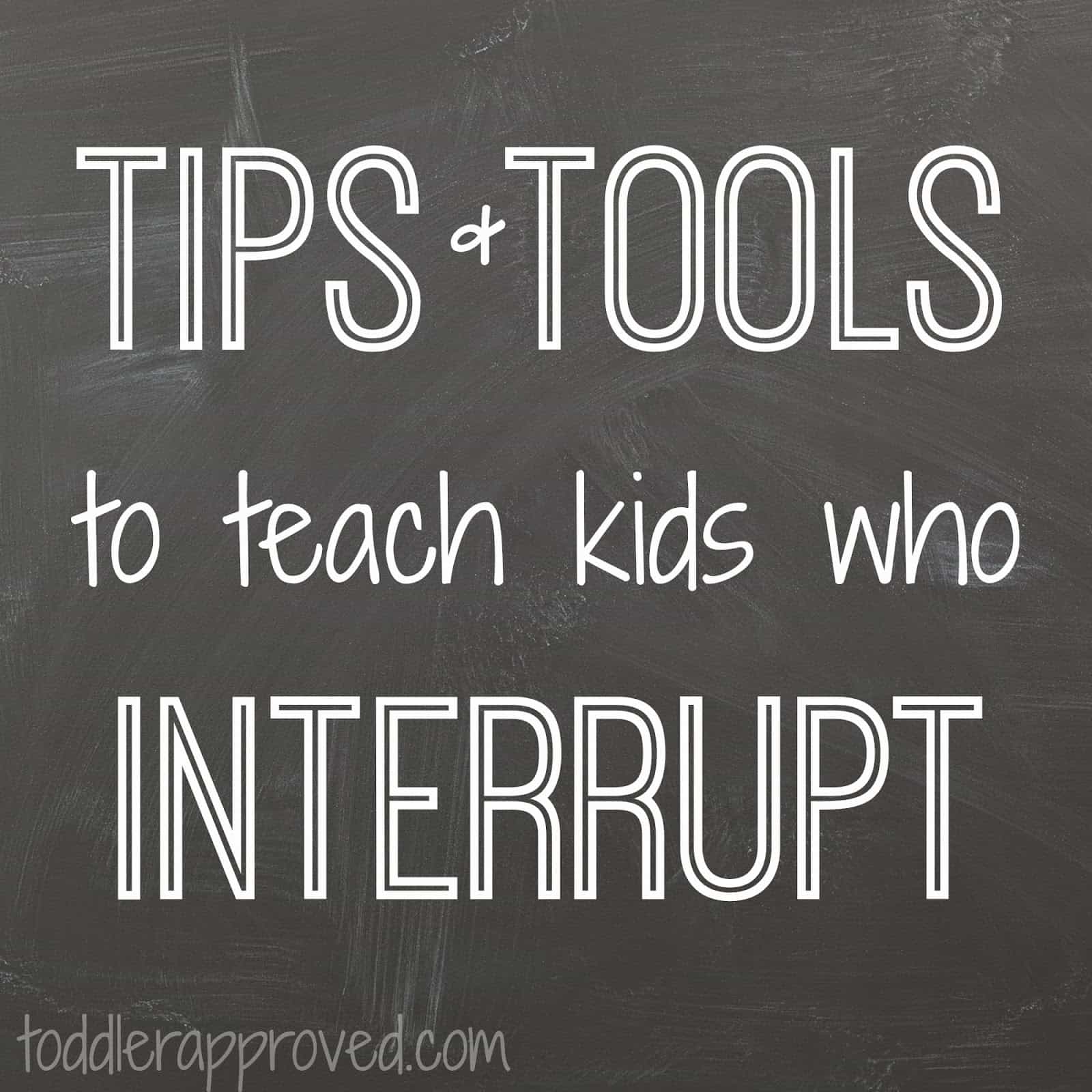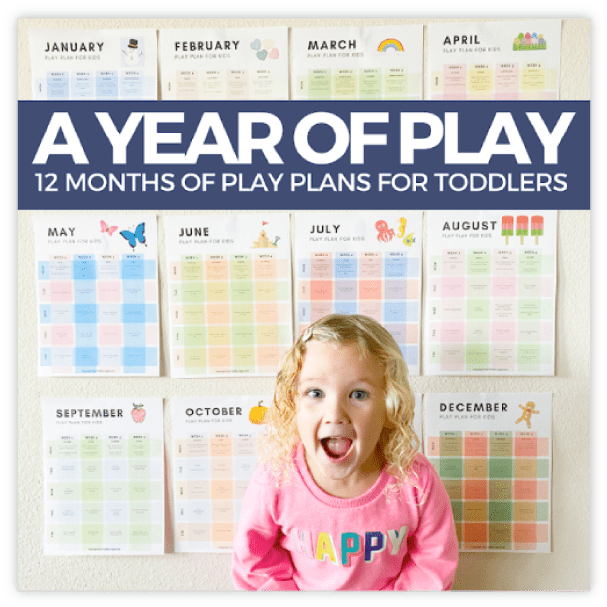As a special education teacher of kids with communication disabilities, I have spent years in classrooms working with kids who struggle to acquire language or engage socially. Now as a mom of a very verbal four year old I have the opposite problem. My son is very social and has a lot to say... ALL.THE.TIME. Sometimes I'm not totally sure how to handle it.
I love having someone to talk with during the day, so I don't totally realize how much he talks until I'm around other adults and they can barely get a word in edgewise. When kids are younger, adults tend to ignore the interruptions and either acknowledge the child quickly and move on, or just talk over the child. If interrupt-itis isn't addressed, it can get out of control as kids get older and become a bad habit.
Once children are in school they are taught cues and signals to get the teacher's attention like raising their hand... but typically in your home you're not going to make your kids raise their hand until you're ready to call on them... right? So, what do you do? How do you teach your child to wait patiently for their turn in a conversation and interrupt appropriately?
I have been loving Julia Cook's book called My Mouth is a Volcano.
It is a children's life skills book that takes an entertaining approach to teaching kids about interrupting and explains a simple technique to help them curb their verbal explosions. My son has been in love with volcanoes for awhile, so this was the perfect book to use as we began to address the topic of interrupting with him.
After reading this book again (and again), we have spent a lot of time role playing and modeling how to interrupt appropriately in our house. This method is one that is working for us right now, but I'm sure we'll tweak it as my son gets older.
Teaching Kids to Interrupt Appropriately (or wait their turn):
1. Tell your child to touch the adult on the arm (or just gently hold their arm) when they have something to say and the adult is already talking to someone else. Teach them not to say, "mom mom mom" over and over again or tap incessantly.
2. Tell your child that you will acknowledge them with a look or a touch (I will place my hand on my son's hand or give him a look that says, "I see you."). I also have put my hand up kind of like a stop sign to remind my son to stop and wait. He needs that cue... it would annoy some kids. When I touch my hand on top of my son's hand and leave it there it seems to reassure him that I will get to him. Once I am done talking I take my hand off and give him my attention.
3. Have your child practice recognizing the eye contact or nonverbal message that means "I see you, I'll give you a turn soon" and practice having them go and find something else to do nearby until it is their turn. Some kids can wait patiently... but my son just gets more anxious, so he needs a task to do until I am done with my conversation.
Older kids can learn how to wait for breaks in a conversation and jump in. That is a pretty complex skill so I wouldn't expect most preschoolers to be able to recognize conversation breaks/pauses. You can help train them though by making them aware of breaks in conversation.
4. When you are practicing with your child, assure them that you will make time in the conversation for them... and then make sure you follow through with that. After your child has waited for their turn to talk for a few minutes, make sure to bring them into the conversation and allow them to share their thoughts/ideas.
5. Teach kids that there are exceptions to the "no interrupting/wait patiently" rule if there is an emergency. Talk about what constitutes an emergency.
Role play these scenarios again and again! My son loves practicing with me and my husband. We take turns being the ones in a conversation and being the interrupter so that everyone gets a chance to practice.
You can also have your child role play with friends or siblings, since some kids tend to interrupt their friends a lot. This can then cause them to become the kid that no one likes because they are not respectful of their friend's conversations (as detailed in Julia Cook's book mentioned above).
Things to think about:
- If you actively include your child in your conversations and take time to ask for their opinions, they will feel less starved for attention and will probably interrupt less.
- Toddlers and preschoolers can't wait for that long. If you are trying to have a long conversation and your child keeps interrupting and can't wait any longer... maybe you should be having your conversation when they are napping, in bed, or at another time.
- Be an advocate for your child when you are spending time with your friends. If they keep talking over your child and never attempt to include your child in a conversation, maybe you should find a time to chat with them when your child isn't around.
- If you have friends coming over that are notoriously bad at including your child and your child tends to interrupt a lot or try and compete for your attention, take breaks to spend special 1:1 time with your child throughout their visit. These don't need to be lengthy breaks, but enough that your child feels like they aren't ignored. You can also find special jobs for them to do to help you or have special activities/projects that they can do sitting right next to you that keep them engaged while you can carry on a conversation.
- Patience and waiting takes practice. Set up "practice" time where you work on these sort of skills when your child isn't in a situation where it is required. The more you practice, the better your child will get at doing it when it is an actual situation and they need to be patient and wait.
There are many adults that believe that children should be seen and not heard... or quiet when adults are speaking... but then I also see adults interrupting kids (or others) all the time... and having no consequences... so it is hard for kids to understand why they can't interrupt too. Make sure that you are being fair with your kids and you are equally respectful of their conversations so that you are setting a good example.
As a former teacher of kids in kindergarten through third grade I definitely think that teaching these skills need to start sooner rather than later. Your child's kindergarten teacher will thank you. I feel bad that I am just starting to work on this with my son and he's already four. Up until now it has been easy to quickly respond to him and then get back to my conversation... but now I think interrupting has become a bad habit for him.
I have collected several great articles about interrupting that you can check out. I don't have the answer to solving "interrupt-itis," but I think a combination of all of these great ideas can help you formulate your own way to handle this challenge with your kids. Children are different, so something that works for one might not work for another. My main recommendation would be to pick your approach, be consistent with it for awhile, assess how it is going, and if it isn't working, try something else.
I would love to hear how you handle interrupting in your home or classroom. If you don't have a strategy yet, I would love to hear your thoughts on these articles below and which ideas you might decide to try.
How to Stop your Preschooler from Interrupting via Disney Family.com
Interrupting: 6 Ways to Get Your Child to Stop via iVillage
"Stop Interrupting!" via Child Perspective
Teach Your Kids to Stop Interrupting via MSN Lifestyle
3 Ways to Cure Your Child's Case of Interrupt-itis via Circle of Moms
Parenting Advice When Kid's Interrupt via The Seeds Network
When Kid's Interrupt via Love and Logic Institute
Stop Interrupting Me! via The Parenting Coach
How to Manage Interruptions in Your Montessori Classroom or Homeschool via Living Montessori Now
Do you have any other great resources, tips, or tools on this topic to share with us?
-------------------------------------------------------------------------------------------------------------------------------------
Did You Know?
Starting June 1st we will be sharing a monthly Toddler Approved newsletter filled with more awesome activities for kids, parenting tips and tools, and other great resources. You can sign up on the blog's sidebar or click the link here to sign up.














My partner teacher used the approach where a child touches her arm & she covers the child's hand until it's okay to talk with one of her students last year. It was AMAZING how wonderfully it worked! I have 3 kiddos this year that I'd already decided I would have to try that approach with. Thanks for all the tips!
Thanks for a great article! I'm going to have a Family Home Evening lesson tonight for my three youngest kids about waiting their turn to talk. Great ideas, and I know the kids will have fun role playing and practicing!
My kids are doing well with these ideas (thanks!) but my problem is the adults who want the children to remain silent all the time, talk all the time themselves, and then when my kids get a chance to tell their story, interrupt my children. How can I tell my 3 & 5 year old that Grandma is being rude but they still need to be polite?! (Talked to grandma, but she feels that every story is incredibly urgent and needs to be told NOW, like the tree that fell in a neighbor's yard 10 years ago. (ie didn't affect them then nor is it of immediate consequence now.)) "I know grandma interrupted and I really want to hear your story. I want to give you my full attention so please wait to tell me again after she leaves." or "Please wait a few minutes longer while grandma finishes this story and then let's go outside where it's quieter and I can hear you better. I know you want Grandma to hear your story, but I don't think she's prepared to listen right now. Maybe you can try again after dinner." And sometimes I try to play it up, "Grandma is telling this really interesting story of a tree! Come listen with me!" I'm just frustrated at the adults setting a really poor example though!
I ask my children and those I work with to keep what they want to say in their head until I am finished. It works fairly well
Thank you for your article & especially your introduction. My 4 yr old lg is very talkative & extremely demanding of my attention. Many people don't understand how exhausting & disruptive it can be for the parent at times. I'm often made to feel that I should just be grateful that she communicates & understands as well as she does, which of course I am up until the point where it infringes on other people's rights to communicate & express themselves (like her 2 yr old brother for example whose speech development is not as advanced & who is often just not given a chance to contribute). I am trying to teach her that after indicating that she wants to say something while I am otherwise engaged, she needs to wait her turn until I give her the signal to continue. The difficulty I am experiencing is that her response is that she has to speak now or else she will forget what she wants to say & then proceeds to getting very upset, whining & even crying . I'm hoping to get some more inspiration in the additional resources & links you have included. Thank you ever so much for the insight & advise.
I need to look for this book. I have a little someone who would benefit from discussing it.
Thank you so much for this! I'm fairly impatient myself, so we'll definitely practising.
I particularly love the "different personality" approach, as opposed to "there's only one correct way to raise a child".
Thank you!
Thank you for this!! My 3 year old, as much as I love hearing him talk – he never stops!! 🙂
Im going to have to look for this book!!
This is a great article. As a speech-language pathologist, I know exactly what you mean about working with kids who struggle to learn to talk and communicate. I also work with kids who talk but struggle with some of these same issues.
I would add one more bit of advice to parents: Make sure the messages you give your child actually have worth and value. Do you back up what you say with action? If not, your message is absolutely worthless to your child. He knows you don't mean what you say.
thank you so much! I love this post. We have been working on this with our kids (4 and 6), doing mostly what you suggest. I do like your tip for helping children to get adult attention appropriately.
My kids tend to talk to me when I'm on the PHONE – so I tell them that it needs to wait until I'm off the phone unless it's an emergency (we have defined emergency with them).
I've noticed that when I'm talking with another adult, if my kid says something to that adult, the adult will politely turn their attention to my kid, not me, allowing the interruption. I usually intervene, to spare the adult embarrassment, and to redirect my kids away from an interruption. Hopefully this will happen less as my children learn how to enter conversations appropriately. They are getting better, I've noticed! Sometimes, my 6 year old will have something to contribute to an adult conversation and whisper it in my ear, and then I will introduce her into the conversation so she can make her comment. It makes a nice pathway for a child, I think.
As an adult whose pet peeve is children who interrupt and adults who don't correct them, THANK YOU for making this a priority with your son!
Very good tips! One thing I do with my own kids and daycare kids is put my hand up or say 1 minute, then when it's their turn, I get very animated and ask them what they were going to say. I've noticed that when I make them wait, they feel like I shot them down and I don't want the kids to lose any self esteem over it. So when it's their turn I make sure to give them my undivided attention. Then I see them get excited over their story!
We have this book and it's a great one! I appreciate your tips. Looking forward to implementing some of these!
This is extremely helpful! My 3 year old hasn't gotten the "quiet and patient" rule yet, but she's beginning to understand that she's interrupted when I give her the "just a minute" look. 🙂